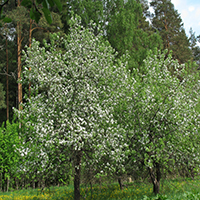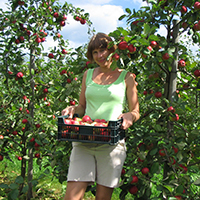FaVOR-DeNonDe
Drying, Juices and Jams of Organic Fruit and Vegetables: What happens to Desired and Non-Desired compounds?
Background
The cultivation of organic fruits and vegetables has recently stood out the aspect related to the quality of the products deriving from the processing chain. A special attention has to be devoted to the local varieties well adapted to a determined territory, and to simple and small processing plants. The scientific research will try to shed light on the popular thought “An home-made food processing, made in small quantities and with high quality raw material, ensures a better sensory and nutritional quality of the processed food product than "industrially" processed food".
Main project activities
- Cultivation of conventional and organic fruit and vegetables (mostly apples, strawberries, plums, tomatoes and sweet pepper)
- Processing of products by making jams, juices and dried products
- Studies made by sensory analyses
- Studies on antioxidants and new tastants content
- Analyses of allergen content
- Analyses of patulin, a mycotoxin content.
Benefits and results
Expected societal benefits of the project
The results from the present project will especially benefit primary organic producers and small-medium sized organic, local processing companies, since created knowledge will be the basis for added value for their agriculture-derived products. The results will also contribute to the awareness of organic consumers if the consumption of organic fruits and vegetables is related to an improved acceptance and taste of these products with respect to other conventional or industrial processed products.
Expected outcomes, results and impact
In general, FaVOR-DeNonDe will contribute significantly to new knowledge about the balance between desired and non-desired components in selected fruits and vegetables as well as how different processing techniques appropriate in organic production affect specific quality traits of fruits and vegetables. Specifically, the impact of organic and innovative processing techniques will influence: 1– the sensory properties and the acceptance of the products; 2- the presence of antioxidant compounds; 3- the presence of allergens; 4- the presence of mycotoxins.
Expected long-term impact
In this framework, the objective is to ensure the socio-economic growth of local communities by their involvement in activities and projects regarding the sustainability in agriculture, also possibly acting at a trans-national level.
How to reach target groups
Differentiated types of involvement will be attempted, for example regarding non-profit associations of rural development, or specialized web sites. These entities will ensure a dissemination activity for the small enterprises working on organic, local and high quality agricultural products.
Project partners
Ulvi Moor, EMU Estonian University of Life Sciences, Estonia.
Eivind Vangdal, BIOFORSK Bioforsk, Norway.
Ulla Kidmose, AU-FOOD Aarhus University, Department of Food Science, Denmark.
Wilfried Schwab, TUM Technische Universität München, Germany.
Gabriele Campanelli, CRA-ORA Consiglio per la ricerca in agricoltura e l'analisi dell'economia agraria, Italy.
Giovanna Speranza, UNIMI University of Milan, Italy.
More about the project
Coordinator of Favor-denonde
- Roberto Lo Scalzo,
tel +39-02239557205
mail:
roberto.loscalzo@entecra.it



The project FaVOR-DeNonDe is funded by ERA-Net CORE Organic Plus Funding Bodies partners of the European Union’s FP7 research and innovation programme under the grant agreement No. 618107.
